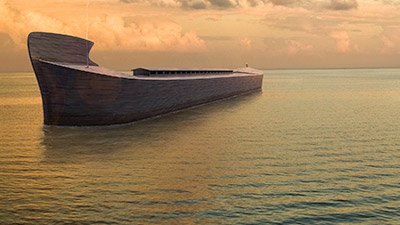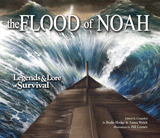
Does the Bible Borrow from a Greek Flood Legend?
An overview of the Greek flood legend of Deucalion and Pyrrha and how it compares and contrasts with Noah’s flood recorded in Genesis
In the Greek Flood legend, a man named Deucalion was warned by his father, the titan Prometheus, that a flood was coming. So he either built an ark shaped like a chest (or, along with his wife, climbed into an already existing chest) and filled it with food and other provisions to survive the coming flood. No sooner had they constructed and provisioned the chest (or boat) that the flood came.1 The Greek god Zeus was sending the flood to punish all of mankind for its wickedness. In reality however, it was specifically the sin of one man, Lycaon, who committed two acts of impiety: he plotted to murder Zeus, and he served up human flesh for dinner to Zeus.2 This act prompted Zeus to flood the earth. Zeus then sent heavy rain and asked for the help of his brother Poseidon, who caused the ocean and river waters to swell and overflow the entire earth. The people who didn’t die right away in the flood, because they were clinging to floating wood or debris, eventually starved to death.3 Considering that the flood only lasted for nine days, this seems to be an illogical position as people have been known to survive much longer periods without food. It raises the question of why the text would not state that the people all drowned. But in any event, Deucalion and his wife (who was also his cousin) Pyrrha survived the nine days of flooding before landing at Mt. Parnassus. Since they were now all alone in the world, they were saddened and confused on what they should do next.4
On Mt. Parnassus they decided to visit the temple (which somehow survived a world-destroying flood) of the Greek goddess Themis, who told them to veil their heads and throw the bones of their mother behind them. They didn’t know what this meant at first, but then they realized this meant to throw stones over their shoulders onto the ground. So they did as they were instructed. The stones Deucalion threw behind him became men, and those Pyrrha threw became women.5 Strangely, this flood legend doesn’t say anything about saving any of the earth’s animals. They just sprang up out of the ground after the flood as the sun warmed the moist earth.6 And the people who spring up from the ground have no relation to Deucalion or Pyrrha (or their future children and grandchildren): they were a new race of humans.
Contrasting the Accounts
In this Greek version, Zeus is angry with people for their wickedness but is not powerful enough to accomplish his goal of sending a flood without asking his brother for help.
So how does this flood legend differ from the biblical account? In this Greek version, Zeus is angry with people for their wickedness but is not powerful enough to accomplish his goal of sending a flood without asking his brother for help. Even though he’s only angry with humans, he kills all the animals and provides no way for them to survive. Zeus also wants to totally wipe out people and not save anyone, but another minor god (Prometheus) sneaks behind Zeus’ back to warn Deucalion and Pyrrha of the upcoming Flood. During the flood, Zeus has a change of heart and allows Deucalion and Pyrrha to survive yet does not communicate with them at all. After the flood is over, Deucalion and Pyrrha must initially figure things out for themselves—and what advice they finally are given by a minor goddess is cryptic.
In the Bible, God himself warns Noah of the coming flood, which he sent because of mankind’s great sin. God tells Noah to make a way of escape for himself, his family, and the land animals. God alone sends the flood, and he alone stops it. He also remembers Noah’s family and all the animals on the ark and commands them to go and fill the earth and spread out on it after the flood. In the Greek story, Zeus had no mercy for humans or animals. But in the Bible, the flood reminds us not only of God’s judgment but also of God’s mercy and concern for the people and animals in the ark and his desire for the preservation of every kind of life.
So how does the Genesis flood compare to the Greek flood legend regarding internal consistency, plausibility, details, and the theology communicated to the reader?
The mechanisms involved in the Noachian flood itself and its duration are much more plausible than a nine-day flood (as in the Greek legend).
The mechanisms involved in the Noachian flood itself and its duration are much more plausible than a nine-day flood (as in the Greek legend). And while the Greek legend mentions that people who survived the flood initially later died of starvation, it would be much more likely that they would have died from lack of freshwater. The Greek flood legend is not even consistent with reality. The biblical ark is built to survive a global flood and to be seaworthy. It is not a shape that would be prone to sink, and it is caulked inside and out with pitch to make it watertight. But in the Greek legend, Deucalion and Pyrrha either climbed into a chest or, in some versions, a hastily constructed boat, neither of which would have beem able to survive such a tempestuous flood. And if (as in most versions) they were inside a chest, the air would have eventually become so saturated with carbon dioxide that they would have suffocated. Had they opened the chest, they would have taken on water and sank. Theologically, God was in control of every aspect of the flood. Although a just and holy God has the right to punish sin and did so in the days of Noah, purging the earth of corruption, God usually chooses to show kindness and mercy towards us (Psalm 8:4–5, 145:8–9). Zeus, by contrast, decided to punish all mankind for the “sins” of one that angered him, needed help from other gods to start and end the flood, had no thought of human survivors, and planned all land animals perishing as well. He eventually relented and let Deucalion and Pyrrha live after they had already survived the flood.
| Greek Flood Legend | Biblical Flood Account |
|---|---|
| Zeus decides to wipe out humanity because of one man’s wickedness | God decides to wipe out humanity because of their combined wickedness |
| Zeus must seek the help of other gods to accomplish his goal and also to end the flood | God alone decides to bring the flood and he alone ends it |
| Zeus does not intend any people or animals to survive his flood | God gives Noah several decades to build an ark to save his family and representatives of all terrestrial animal kinds. Noah also preached during this time, yet men remained wicked. |
| The flood lasts nine days | The entire length of the flood including abatement is about a year |
| Only two people survive the flood | Eight people and all terrestrial land animal kinds survive the flood, all reproductively capable and commanded to fill the earth again |
| Humanity is recreated through transformation of rocks to people | Repopulation is naturally brought about through procreation |
| Animals are recreated spontaneously from the earth | The animal kinds are naturally replenished through procreation |
Noah and the flood are mentioned in several other passages in Scripture (e.g., Matthew 24:37–39; 1 Peter 3:20; 2 Peter 2:5), and one other OT and several other NT passages (below), which all corroborate many of the details of Genesis 6–9:
- God is angry because man is corrupt (see also 2 Peter 2:5)
- God comes to Noah and tells him that he is sending a flood to wipe out all air-breathing life on land (see also Luke 17:27 and Hebrews 11:7)
- God gives Noah instructions on how to build the ark, which Noah obeys (see also Hebrews 11:7 and 1 Peter 3:20)
- God promises never again to flood the entire earth (see also Isaiah 54:9)
By contrast, the Greek flood legend has several different variations. Did Deucalion build a boat or chest-shaped boat, or did he just find a chest and provision it before jumping in with his wife, Pyrrha? Were they the only survivors of the flood? Later Greek flood legends mention that Megarus, a son of Zeus, Dardanus (founder of Troy), and the people of Delphi also survived the flood, usually by divine favor of some other minor god.7
There Really Is No Comparison
In every aspect of internal consistency (no contradictions in subsequent accounts), plausibility (even in divine judgment, the biblical account shows a pattern of supernatural, merciful governance over natural events and an economy of miracles), details (such as divine communication to humans is to do things that make logical sense in the pending situation), and theology (God being sovereign over the events he initiates), we see a narrative far superior to the Greek legend, which copied and corrupted some elements of the Genesis account. When accusations come, why is it always the Bible that is considered to be the borrower of a common-to-mankind legend? Scripture records names that can be traced through genealogical accounts, back to the sons of Noah who boarded the ark with him—including Javan, Noah's grandson who founded Greece. The intent of the Genesis 6–9 account is to convey real history, which happened at a distinct point in time (not in the “mists of legend”), and to foreshadow God’s ultimate merciful plan of preserving his people from righteous judgment through the sending of his own Son some 2,400 years later.
Footnotes
- “Deucalion and Pyrrha”, Greeka, Accessed July 13, 2021, https://www.greeka.com/sterea/delphi/myths/deucalion-pyrrha/.
- N.S. Gill, “Ancient Greek Flood Myth of Deucalion and Pyrrha,” April 1, 2020, https://www.thoughtco.com/flood-myth-of-deucalion-and-pyrrha-119917.
- Ovid, Metamorphosis, Book 1, lines 244–312, translated by A.S. Kline, 2000, http://www.poetryintranslation.com/PITBR/Latin/Metamorph.htm. This work was originally in Latin, and the Roman names for Zeus and Poseidon (Jupiter and Neptune, respectively) are used in it, but the details are essentially unchanged.
- “Ovid's Metamorphoses: Deucalion and Pyrrha,” University of Oklahoma, http://mythfolklore.blogspot.com/2014/03/ovids-metamorphoses-deucalion-and-pyrrha.html.
- Edward S. Ellis, The Story of the Greatest Nations and the World's Famous Events, Vol. 1 (New York, Francis R. Niglutsch: 1913), 111.
- Ovid, lines 416-437.
- “Deucalion in Greek Mythology,” Greek Legends and Myths, https://www.greeklegendsandmyths.com/deucalion.html.
Recommended Resources

Answers in Genesis is an apologetics ministry, dedicated to helping Christians defend their faith and proclaim the good news of Jesus Christ.
- Customer Service 800.778.3390
- © 2024 Answers in Genesis







